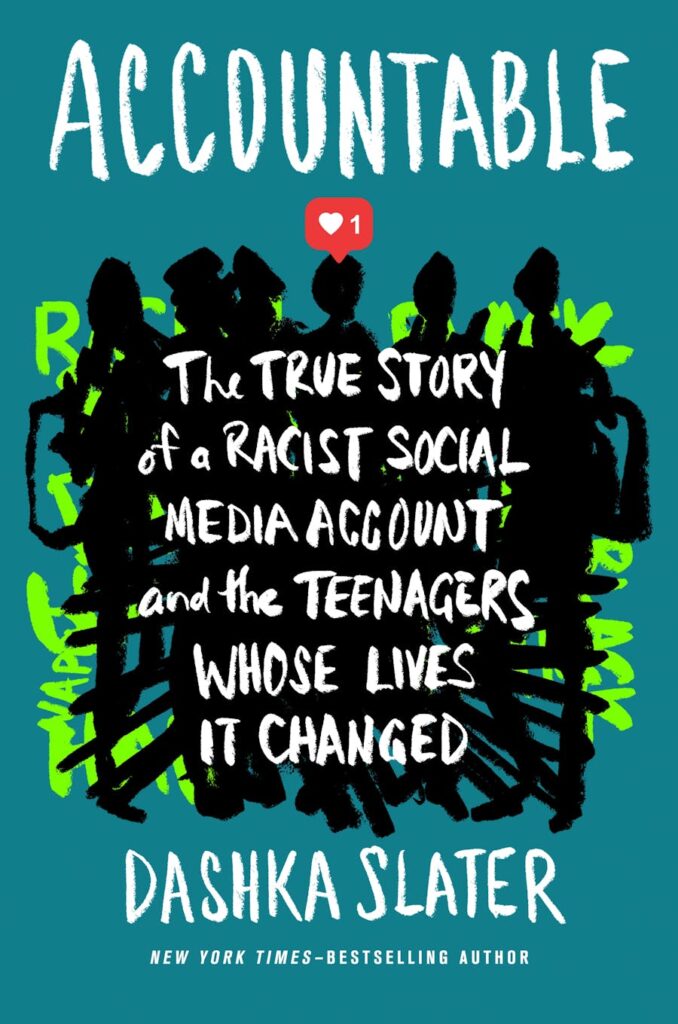Educator’s Guide: Accountable: The True Story of a Racist Social Media Account and the Teenagers Whose Lives It Changed by Dashka Slater

Accountable: The True Story of a Racist Social Media Account and the Teenagers Whose Lives It Changed
By Dashka Slater
Ages 12-18
On Sale Now!
From the New York Times-bestselling author of The 57 Bus comes Accountable, a propulsive and thought-provoking true story about the revelation of a racist social media account that changes everything for a group of high school students and begs the question: What does it mean to be held accountable for harm that takes place behind a screen?
When a high school student started a private Instagram account that used racist and sexist memes to make his friends laugh, he thought of it as “edgy” humor. Over time, the edge got sharper. Then a few other kids found out about the account. Pretty soon, everyone knew. Ultimately no one in the small town of Albany, California, was safe from the repercussions of the account’s discovery. Not the girls targeted by the posts. Not the boy who created the account. Not the group of kids who followed it. Not the adults—educators and parents—whose attempts to fix things too often made them worse.
In the end, no one was laughing. And everyone was left asking: Where does accountability end for online speech that harms? And what does accountability even mean? In Accountable, award-winning and New York Times–bestselling author Dashka Slater has written a must-read book for our era that explores the real-world consequences of online choices.
Accountable
Accountable
Accountable
Praise for Accountable
“Journalist and author Slater once again achieves another level of introspection about society through the lens of teen behavior . . . The shocking reality that Albany could be any town is what sustains the rabid interest in seeing how the story plays out since it touches on many aspects of contemporary culture . . . This is a well-timed page-turner due to Slater’s investigative reporting and must be read, shared, and discussed. Make this a priority purchase.” —School Library Journal, starred review
“This meticulous retelling from Slater, author of the best-selling, Stonewall-winning The 57 Bus (2017), documents the ensuing events: shock, outrage, accusations, protests, threats, firings, lawsuits, and the aftermath . . . This is a compelling and contemporary cautionary tale that should be required reading for any teen before they create, comment, or even like a media post.” —Booklist, starred review
“In this gripping true story, Slater draws on her journalistic skills, utilizing interviews, court documents, social media and other sources to pull together a compelling full picture of an event that ripped apart a community and deeply impacted the lives of everyone involved. Short chapters keep the pace at a clip, as Slater’s reporting, direct quotes, and first-person poems document the emotional devastation and real world consequences over the following years of pain, flailing school administrators, protests, and lawsuits. No teen is absolved of their conduct, but everyone is understood and fully humanized . . . Perhaps Slater’s greatest feat is how successfully this nonfiction narrative informs about social media, racism, white supremacy, and restorative justice without veering into preachiness. She is able to cut to the core of the situation, searingly capturing raw pain and empathy for the harmed teens, providing enough distance to understand the complexity of the Instagram followers, and demonstrating what holding someone accountable looks like.” —The Bulletin of the Center for Children’s Books, starred review
“Award-winning journalist Dashka Slater (The 57 Bus) is brilliant at dissecting a true-crime story, exhibiting its different parts for readers, and relating a balanced narrative that illustrates the nuances inherent in all interpersonal interactions, in person or online . . . Slater ultimately shows readers that, while racist actions can be unconscious, they remain offensive and harmful, and the perpetrator should be held accountable. Silence, too, she communicates, is a form of condoning racism and contributes to the problem. But Slater does not solve problems or answer the questions; instead, she scrupulously illustrates the complexity of this case and reminds the audience that there are no quick fixes. This is a moving book with the power to make readers look deep within themselves for ways they can contribute to the solutions and keep from becoming a part of the problem . . . Slater expertly conducts a vivisection of an online racism scandal that reveals scars on the beating heart of a small town in California.” —Shelf Awareness
“The author of the acclaimed The 57 Bus (2017) delves into another complex story involving teens, personal choices, and societal forces . . . Slater’s thorough research includes candid interviews with those on both sides. She accessibly explores edgy meme culture, online hate speech, the students’ social dynamics, a disastrous mediation session, the school district’s actions, subsequent lawsuits, and how individuals were affected post-graduation. Short, punchy chapters offer interestingly varied formats and perspectives. The book will spark deep reflection on degrees of complicity, whether and when to forgive, what contributes to genuine remorse and change, and what parents and educators could have done differently . . . Thorough, thought-provoking, and all too relevant.” —Kirkus Reviews
“Slater (The 57 Bus) chronicles the fallout of a high schooler’s bigoted Instagram account in this emotionally raw work . . . Raising essential questions about accountability and complicity, this pertinent read encourages personal reflection and presents a balanced, non confrontational look into a situation that, as one student affirms, had gone ‘a little too far.” —Publishers Weekly


